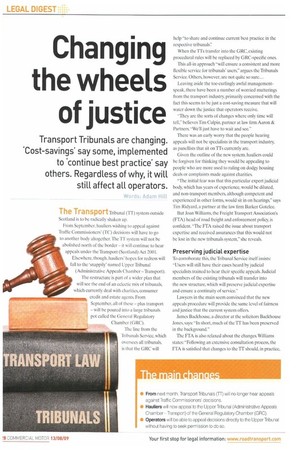Changing the wheels of justice
Page 28

Page 29

If you've noticed an error in this article please click here to report it so we can fix it.
Transport Tribunals are changing. 'Cost-savings' say some, implemented to 'continue best practice' say others. Regardless of why, it will still affect all operators.
Adam Hitt
The Transport Tribunal (TT) system outside Scotland is to be radically shaken up.
From September, hauliers wishing to appeal against Traffic Commissioners' (TC) decisions will have to go to another body altogether. The TT system will not be abolished north of the border — it will continue to hear appeals under the Transport (Scotland) Act 2001. Elsewhere, though, hauliers' hopes for redress will fall to the 'snappily' named Upper Tribunal (Administrative Appeals Chamber —Transport).
The restructure is part of a wider plan that will see the end of an eclectic mix of tribunals, which currently deal with charities, consumer credit and estate agents. From September, all of these — plus transport — will be poured into a large tribunals pot called the General Regulatory Chamber (CiRC).
The line from the Tribunals Service, which oversees all tribunals, is that the GRC will help "to share and continue current best practice in the respective tribunals': When the TTs transfer into the GRC, existing procedural rules will be replaced by GRC-specific ones.
This all-in approach "will ensure a consistent and more flexible service for tribunals' users," argues the Tribunals Service. Others, however, are not quite so sure...
Leaving aside the toe-curlingly awful managementspeak, there have been a number of worried mutterings from the transport industry, primarily concerned with the fact this seems to be just a cost-saving measure that will water down the justice that operators receive.
"They are the sorts of changes where only time will tell," believes Tim Culpin, partner at law firm Aaron & Partners. "We'll just have to wait and see."
There was an early worry that the people hearing appeals will not be specialists in the transport industry, as panellists that sit on TTs currently are.
Given the outline of the new system, hauliers could be forgiven for thinking they would be appealing to people who are more used to ruling on dodgy housing deals or complaints made against charities "The initial fear was that this particular expert judicial body, which has years of experience, would be diluted, and non-transport members, although competent and experienced in other forms, would sit in on hearings," says Tim Ridyard, a partner at the law firm Barker Gotelee.
But Joan Williams, the Freight Transport Association's (FTA) head of road freight and enforcement policy, is confident. "The FTA raised the issue about transport expertise and received assurances that this would not be lost in the new tribunals system," she reveals
Preserving judicial expertise
To corroborate this, the Tribunal Service itself insists: "Users will still have their cases heard by judicial specialists trained to hear their specific appeals. Judicial members of the existing tribunals will transfer into the new structure, which will preserve judicial expertise and ensure a continuity of service."
Lawyers in the main seem convinced that the new appeals procedure will provide the same level of fairness and justice that the current system offers.
James Backhouse, a director at the solicitors Backhouse Jones, says: short, much of the TT has been preserved in the background."
The FTA is also relaxed about the changes. Williams states: "Following an extensive consultation process, the FTA is satisfied that changes to the TT should, in practice, make no discernible difference to the way in which operators are dealt with."
The bottom line is that, even with a unified tribunals system. there will still be a variety of routes down which transport operators can go if they wish to appeal — and crucially, hauliers will be able to appeal decisions without having to seek leave to do so.
"There were issues that the FTA highlighted that were causing concern, and which we sought to influence, such as our opposition to the proposed permission to appeal, and that appeals to the tribunal should not be limited to a point of law," continues Williams.
Option to appeal
Under the new system, the opportunity to appeal is still available.Tcs will bear cases at Public Inquiry, and operators will be able to appeal their decisions directly to the Upper Tribunal without the need for permission.
"There were fears that there might be no automatic right of appeal without [being given] leave to do so," says Ridyard. "This appears to have been resolved so the situation will remain largely, if not entirely, as it is."
Williams points out that if hauliers are not satisfied with a decision, they can seek justice at the Court of Appeal. "So, in reality. the FTA believes the level of fairness has not changed," she adds. Still, this restructure has the hallmarks of a cost-saving ploy, although, without analysing the numbers, that is hard to pin down. "In my view, it is probably a cost-saving exercise," says one lawyer who did not wish to be named.
However. Ridyard says: "I cannot imagine that cost wasn't an issue, since one of the issues behind this was trying to streamline the number of different tribunals."
Interpreting 0-licence laws The FTA, though, is not so sure. -This is a complete restructuring of all tribunals, not [List transport, and while we haven't explored the costs, it seems unlikely that the purpose is to cut them," believes Williams
It is true that relatively few hauliers go to appeal, not least because (their lawyers would say) they generally get the right result in the first place from a TC. But one legal source warns: "You are always capable of getting 'flaky' decisions from 'flaky' TCs."
Even if you may never need it, the appeals process is still significant. And changes to road transport's legal or administrative framework will have an effect.
-Anything that takes place in terms of decision-making [is important] for all hauliers, in that decisions made by the IT shape the interpretation of 0-licence laws," Ridyard says. "Anything affecting the TT will have an indirect impact on all operators." I.












































































































































